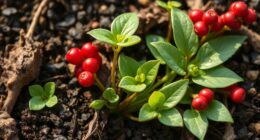We're taking the first step towards a herbalism degree by researching accredited programs at institutions like Bastyr University or Maryland University of Integrative Health. Next, we'll enroll in a herbalism course, ensuring it covers botany, pharmacology, and clinical practice. We'll then complete coursework, studying herbal medicine, anatomy, and physiology. Practical experience is essential, so we'll participate in internships and workshops to develop our skills. Finally, we'll pursue certifications in aromatherapy or acupuncture to enhance our career prospects. By following these five steps, we'll gain a thorough education in herbalism and set ourselves up for success in this holistic field – and there's more to explore ahead.
Key Takeaways
• Research and enroll in an accredited herbalism program, examining curriculum, faculty expertise, and specialized tracks.
• Complete coursework covering botany, herbal medicine, and clinical practice, gaining a strong foundation in clinical herbalism.
• Gain practical experience through internships, apprenticeships, volunteering, and workshops, developing essential skills and confidence.
• Pursue additional certifications, such as aromatherapy or acupuncture, to enhance your degree and increase earning potential.
• Stay updated on the latest trends in herbal medicine through online programs, expanding your career path and client base.
Research Accredited Herbalism Programs
As we embark on our journey to pursue a herbalism degree, we start by researching accredited herbalism programs that meet our state's educational requirements and align with our career goals.
We search for institutions like Bastyr University or Maryland University of Integrative Health, which offer accredited programs that prepare us for a successful career in herbalism.
We explore in-depth the curriculum, examining the faculty's expertise and hands-on training opportunities that will equip us with the necessary skills. We also investigate specialized tracks available in herbalism, such as botanical medicine or herbal pharmacy, to tailor our education to our interests.
Additionally, we assess the program's reputation, alumni success, and cost, ensuring it fits our budget and schedule. By doing so, we can make an informed decision about which program is the best fit for us.
Enroll in a Herbalism Course

We're ready to take the next step in our herbalism journey by selecting a thorough course that aligns with our career goals and state's educational requirements. To do this, we need to research and select a herbalism course from accredited institutions or online platforms.
We should check the course duration, curriculum, and requirements for enrollment to make sure it meets our state's standards. A detailed herbalism course should cover topics like herbal medicine, botany, pharmacology, and clinical practice.
We should also verify if the course offers hands-on training, internships, or clinical experience to gain practical skills. When choosing a herbalism program, we should consider factors like cost, flexibility, and accreditation.
Complete Required Coursework

With our herbalism course chosen, we immerse ourselves in completing the necessary coursework, which encompasses a wide range of topics. We explore the world of herbal medicine, investigating its principles, and practices. Our herbal education takes us on a journey through anatomy, physiology, and herbal pharmacology, providing a solid foundation in clinical herbalism.
| Coursework Topics | Description |
|---|---|
| Botany and Plant Identification | Study of plant anatomy, morphology, and taxonomy |
| Herbal Medicine Making | Hands-on training in herbal preparations and formulations |
| Holistic Health and Wellness | Understanding the role of herbalism in holistic health practices |
| Traditional Systems | Exploration of Ayurveda, Traditional Chinese Medicine, and Western Herbalism |
| Herbal Pharmacology and Clinical Herbalism | In-depth study of herbal pharmacology and its application in clinical settings |
Through our coursework, we gain a deeper understanding of herbal schools of thought, from Traditional Chinese Medicine to Western Herbalism. We develop a strong foundation in plant identification, herbal pharmacology, and clinical herbalism, preparing us for a successful career in the field of herbalism.
Gain Practical Experience

We fully immerse ourselves in the world of herbalism by gaining hands-on experience through internships, apprenticeships, and volunteering at herbal clinics, where we can practice making remedies, conducting consultations, and working with clients.
This hands-on experience helps us develop essential skills and gain confidence in our abilities. We also participate in workshops and courses focused on herbal medicine, which deepen our knowledge and understanding of the subject.
Additionally, we work in herbal gardens, where we learn about different herbs, their properties, and uses. We seek mentorship from established herbalists, who guide us in refining our skills and sharing their expertise.
Through volunteering, we get to work with clients, conduct consultations, and develop our communication skills. All these experiences combined provide us with a thorough understanding of herbalism, enabling us to become proficient herbalists.
Pursue Additional Certifications

Enhancing our herbalism degree with specialized certifications in areas like aromatherapy, Ayurveda, or homeopathy can greatly broaden our expertise and career prospects. By specializing in these areas, we can differentiate ourselves from other herbalists and attract a wider client base.
For instance, if we're interested in traditional Chinese medicine, we can pursue certifications in acupuncture and become a licensed acupuncturist. The Herbalists Guild (AHG) offers a registered herbalist certification, which demonstrates our expertise in herbalism and commitment to natural remedies.
Online programs and continuing education courses can help us stay updated on the latest trends and advancements in herbal medicine. As we pursue additional certifications, we'll be able to cater to a wider range of clients and expand our career path. This won't only enhance our reputation but also increase our earning potential.
Frequently Asked Questions
What Are the First Steps to Becoming an Herbalist?
We're interested in becoming herbalists, but where do we start?
First, we need to understand what herbalism is and what it entails. Herbalism is the practice of using plant-based remedies to promote health and wellness.
To become an herbalist, we'll need to acquire knowledge of botany, pharmacology, and anatomy, as well as develop skills in plant identification, preparation, and application.
How Long Does It Take to Get a Degree in Herbalism?
We typically spend around 1-2 years completing a Herbalism degree, which requires a significant amount of study hours – roughly 700-1,600 hours to be exact.
This extensive education is vital in covering essential subjects like botany, materia medica, and herbal pharmacy, ultimately preparing us for our future roles as herbalists.
How Can I Study Herbalism?
We're excited to immerse ourselves in the world of herbalism and explore our options.
To study herbalism, we can enroll in a formal program at a recognized institution or school, which provides a structured learning environment. Alternatively, we can take online courses for flexibility and convenience.
Additionally, attending workshops, seminars, and conferences can enhance our knowledge, while seeking mentorship from experienced herbalists can deepen our understanding and skills.
What Should I Major in for Herbalism?
When pursuing a degree in herbalism, it is important to focus on majors that align with our interests and career goals. One option is to choose a major in herbalism or related fields like botany, nutrition, or alternative medicine. These programs usually offer coursework in herbal medicine, plant identification, and holistic health. This provides students with a solid foundation in herbal therapeutics, pharmacology, and traditional medicine systems.
Conclusion
As we've outlined, pursuing a herbalism degree requires dedication and perseverance. By following these 5 steps, we can open the door to a rewarding career in herbalism.
Like a recipe for a traditional herbal remedy, each step builds upon the last, combining to create a thorough education.
With persistence and hard work, we can reap the benefits of a fulfilling career, helping others harness the power of plants to promote health and wellness.










